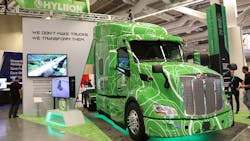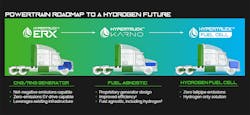Hyliion on track for Hypertruck production in 2023; plans fuel-cell truck with Hyzon
Hyliion had a busy 2022, and this year looks to be even more positive, according to leadership’s plans revealed on a March 1 conference call to go over Q4 2022 results.
By the end of this year, Hyliion plans to go into production on its Hypertruck ERX hybrid Class 8 trucks, which supplement electric batteries with onboard CNG generators. The platforms are placed onto a Peterbilt Model 579 chassis at the OEM’s Denton, Texas, plant. The Hypertruck is currently undergoing winter testing, a critical milestone before entering production.
The last step will be receiving various state and federal approvals.
“We are on track for obtaining CARB, EPA and NHTSA certifications in the second half of the year, which we expect to be our final milestones before delivering units to fleets,” said Hyliion founder and CEO Thomas Healy.
See also: Hyliion founder on hybrid truck benefits, roadmap to hydrogen
And to ensure the company can offer a broader range of fuel options, Hyliion is also building its first fuel-cell electric truck prototype with partner Hyzon Motors.
“Together, we will integrate the Hyliion electric powertrain system and the Hyzon fuel cells into a Peterbilt [Class 8 sleeper] chassis,” explained Healy, who noted hydrogen-powered trucks will see increased demand as fueling infrastructure increases and fuel cost comes down.According to a Hyzon statement: “Collaboration between Hyzon and Hyliion leverages the competitive advantages of each company to speed the development of a fuel cell Class 8 semi-truck, while eliminating duplicative costs and improving vehicle performance and reliability.”
On top of these recent announcements, Hyliion will continue to figure out how the transportation industry can benefit from the Karno generator technology Hyliion acquired from General Electric last summer. These fuel-agnostic generators can use more than 20 fuel types, incoming CNG, RNG, and hydrogen, could offer more than 20% efficiency improvements over conventional equipment. Hyliion sees these as the next-generation generator for the HyperTruck and serve as a bridge to when fuel-cell trucks are viable. Healy also envisions these generators could be deployed as distributed power solution to power fleet’s charging stations for battery-electric vehicles.
On the personnel side, Hyliion has hired 50 new employees, including CFO John Panzer, Chief Strategy Officer Sherry Lance, and former Meritor CEO Jay Craig as chairman of the board.
Even with all of this positive news, 2023 could very well be a make-or-break year for the electric powertrain manufacturer.
A quick look at the financials
During the last three months of 2022, Hyliion booked sales of $1.1 million and a net loss of $29.4 million, the latter number being right in line with its loss from 2021’s fourth quarter. The company finished the year with a net loss of $125 million (versus a loss of $96 million in 2021) and total available liquidity of about $422 million. Of that last number, $120 million was in cash and cash equivalents.
For 2023, Healy and his team are forecasting that revenues will be flat versus 2022 as work on the launch of the Hypertruck ERX continues. They expect operating expenses to grow to somewhere between $130 million and $140 million, with the midpoint of that range about 9% higher than 2022’s total when one-time expenses related to the acquisition of Karno are excluded.
That opex number as well as capital spending on Hyliion’s Austin plant and other investments has led the company’s leaders to estimate that they will use up a little less than $200 million in cash this year compared to $135 million used in 2022.
Panzer said Hyliion should still have more than $200 million in liquid assets at the end of the year, which is when the first HyperTrucks are expected to be delivered.
“That leaves us in good shape,” Panzer said. “So we have no plans to raise any capital all this year and it puts us in a great position to start 2024 as we start to ramp up sales.”
Shares of Hyliion (Ticker: HYLN) were unchanged March 1 at $2.83. Over the past six months, they have fallen about 15%, trimming the company’s market capitalization to about $500 million.
All comes down to the Hypertruck
The fate of Hyliion really comes down to if the Hypertruck gives fleets what they are looking for. So far, 210 orders have been placed. Fleet early adopters include Ruan, which placed an order for 10 Hypertrucks, and DSV, which also ordered 10, with an option for 10 more.
“As we go through additional fleet trials, we expect to continue to grow our backlog of orders for production slots,” Healy said.According to the CEO, other fleets have shown interest in the Hypertruck, “but would like to see us reach additional development milestones prior to participating in fleet trials or placing orders.”
To make a great first impression, Hyliion has instituted a “Founder’s program,” which will “provide white glove service and we'll have a launch facility in the Dallas region to support and service these trucks to ensure a positive customer experience,” Healy said.
Right now, Hyliion’s focus is completing the Hypertruck’s ongoing winter trials.
“We've been pleased with the results thus far, and while we've encountered some opportunities to strengthen components, we do not expect anything we've experienced today to adversely impact our plans to start commercial production of the power train later this year,” Healy said.
Colder regions may be where the hybrid solution excels over trucks that run solely off batteries.
“Electric vehicles really struggle due to cold weather,” explained Healy, a Carnegie Mellon graduate who majored in mechanical engineering. “Because our power train has a CNG range extender, it can operate more reliably over greater distances than a pure plug-in vehicle.”
On the incentive front, Hyliion engineers actually increased the ERX’s all-electric range from 25 to 75 miles to fulfill California’s Advanced Clean Truck Rule regulations and qualify for zero-emission vehicle sales credit. Starting in 2024, the state requires certain fleets to purchase zero-emission vehicles. For State, county and city fleets, half purchased must be ZEVs, while drayage fleets can only buy ZEVs.
As it stands, Hypertruck qualifies for 75% of the ZEV credit that a plug-in electric truck or fuel cell truck will qualify for. The Class 8 hybrid would also qualify for 100% of CARB’s Advanced Clean Fleets credit, which is still in the drafting stage.
Hyliion customers can also receive a $40,000-tax credit from the Inflation Reduction Act.
Healy noted that in the case of a ZEV being unavailable, CARB will not provide fleets an exception if a near-zero vehicle, such as the ERX is available.
Fleets may get a good deal, but Hyliion will be losing money on the first production Hypertrucks.
“We do expect negative gross margins on our initial units,” Healy said. “This is due to a variety of reasons from procuring lower volumes, manufacturing inefficiencies, and ordering parts early to ensure we have all the parts to hit our commercialization milestones. While it’s too early to say when we will be gross margin positive, we have already begun a variety of initiatives to get to positive gross margins as quickly as possible.”
More on the Hyzon partnership
Hyzon is a spinoff of Singapore-based Horizon Fuel Cell Technologies, which has nearly two decades of fuel-cell manufacturing experience. The company has several solutions available including the Class 8, which converts Freightliner Cascadia daycabs into fuel-cell electric vehicles.
The company also replaced its CEO Craig Knight over the summer for financial reporting discrepancies, and is on the verge of being delisted by NASDAQ. Regardless of Hyzon’s corporate issues, Healy trusts its technology is the best match.
“Among other factors, after looking at several other fuel cell manufacturers, we ultimately chose Hyzon because we believe their fuel cell technology is sized right for Class 8 applications,” Healy said. “Hyzon only needs one fuel cell whereas some other providers need to use multiple fuel cells.”
The prototype should be ready by the start of Q4 2023.
About the Author
John Hitch
Editor
John Hitch is the editor-in-chief of Fleet Maintenance, providing maintenance management and technicians with the the latest information on the tools and strategies to keep their fleets' commercial vehicles moving. He is based out of Cleveland, Ohio, and was previously senior editor for FleetOwner. He previously wrote about manufacturing and advanced technology for IndustryWeek and New Equipment Digest.
Geert De Lombaerde
Senior Editor
A native of Belgium, Geert De Lombaerde has more than two decades of experience in business journalism. Since 2021, he has written about markets and economic trends for Endeavor Business Media publications FleetOwner, Healthcare Innovation, IndustryWeek, Oil & Gas Journal, and T&D World.
With a degree in journalism from the University of Missouri, he began his reporting career at the Business Courier in Cincinnati. He later was managing editor and editor of the Nashville Business Journal. Most recently, he oversaw the online and print products of the Nashville Post and reported primarily on Middle Tennessee’s finance sector and many of its publicly traded companies.




